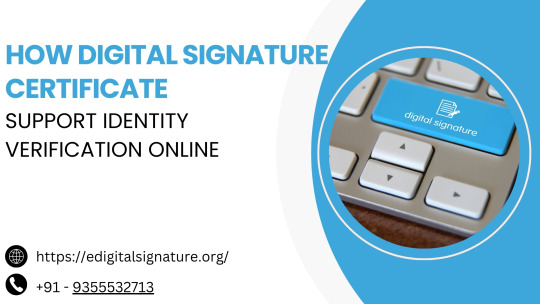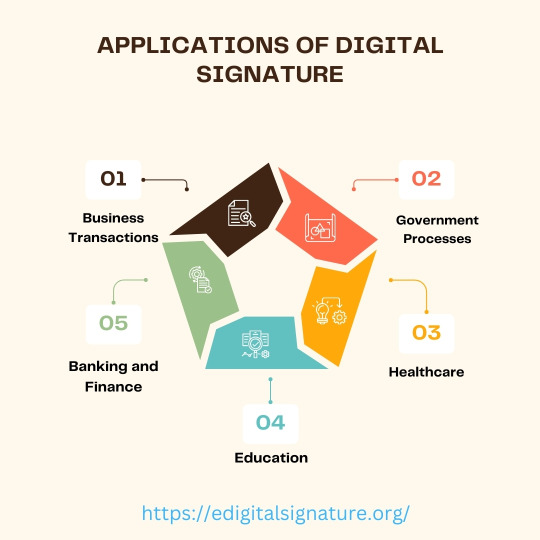Don't wanna be here? Send us removal request.
Text
How Digital Signature Certificate Support Identity Verification Online

In an era dominated by digital transactions and online interactions, ensuring secure identity verification is more critical than ever. Digital Signature Certificate (DSC) plays a pivotal role in authenticating identities, securing communications, and fostering trust in digital ecosystems. This article explores how DSCs support identity verification online, their applications, and their significance in various industries.
Understanding Digital Signature Certificates
A Digital Signature Certificate (DSC) is an electronic credential issued by a Certifying Authority (CA) that validates the identity of an individual or an organization. DSCs use cryptographic techniques to ensure the integrity, authenticity, and non-repudiation of digital communications. These certificates come in various classes, each serving different levels of security and authentication needs.
Steps to Apply for Digital Signature Certificate
Step 1: Visit Our Website
Begin the process by navigating to our official website.
Step 2: Enter Your Details
User Type: Select whether you are an individual or representing an organization.
Certificate Type: Choose between a signing certificate or a combination of signing and encryption.
Validity Period: Decide the duration for which you need the certificate.
Personal Information: Provide your name, phone number, email address, and physical address.
Terms & Conditions: Check the box to confirm your agreement.
Submit: Click the submit button to proceed.
Step 3: Select Your Token Option
If you already have a USB token, select "No."
If you require a new one, choose "Yes."
Step 4: Make the Payment
Enter your payment details.
Choose your preferred payment method: net banking, credit card, debit card, or UPI.
Step 5: Finalize the Application
Review: Double-check all the details entered.
Submit: Click submit and wait for a confirmation email.
Step 6: Receive Your Digital Signature Certificate
After processing, your digital signature will be delivered on a USB token for secure use.
The Role of DSCs in Identity Verification
Identity verification involves confirming the authenticity of an entity before granting access to digital platforms, transactions, or sensitive information. DSCs support identity verification through the following mechanisms:
1. Authentication and Trust Establishment
DSCs provide a verifiable identity for individuals and organizations in digital environments. When a DSC is used, it confirms that the signer is legitimate, thereby eliminating the risk of identity fraud. This authentication process is crucial for secure access to online services such as banking, government portals, and corporate systems.
2. Data Integrity Assurance
Digital signatures created using DSCs ensure that documents remain unaltered after signing. If any modification occurs, the signature becomes invalid, alerting the recipient to potential tampering. This feature is vital in legal, financial, and government transactions where document integrity is paramount.
3. Non-Repudiation
Non-repudiation means that a signer cannot deny signing a document once a digital signature is applied. DSCs create a binding proof of identity, preventing fraud and unauthorized access. This aspect is particularly important for contractual agreements and official communications.
4. Encryption for Secure Communication
DSCs facilitate encrypted communication, ensuring that sensitive information is only accessible to authorized parties. Encryption helps protect personal data, financial transactions, and classified information from cyber threats such as phishing and hacking.
Applications of DSCs in Identity Verification
The adoption of DSCs spans multiple sectors, reinforcing identity verification and security in various domains.
1. Banking and Financial Services
Financial institutions require robust identity verification mechanisms to prevent fraud and ensure compliance with regulatory standards. DSCs enable secure online banking, digital loan approvals, and electronic Know Your Customer (e-KYC) processes. By digitally signing financial documents, customers and banks can establish trust and transparency.
2. Government Services and e-Governance
Governments worldwide are integrating DSCs into their digital infrastructure to streamline identity verification for citizens. Services such as e-filing tax returns, applying for business licenses, and accessing welfare benefits leverage DSCs to authenticate users and enhance service delivery.
3. Healthcare Sector
In healthcare, patient records, medical prescriptions, and insurance claims require stringent identity verification. DSCs ensure that only authorized healthcare professionals can access or modify sensitive medical data, reducing the risk of unauthorized access and identity theft.
4. Corporate and Business Transactions
Corporations use DSCs for signing contracts, verifying employees' identities, and securing confidential communications. This practice minimizes fraud, accelerates business processes, and ensures compliance with industry regulations.
5. Education and Online Learning
Educational institutions and e-learning platforms use DSCs to verify student identities, issue digitally signed certificates, and protect academic records from forgery. This enhances credibility and trust in online education systems.
Benefits of Using DSCs for Identity Verification
The implementation of DSCs in identity verification offers numerous advantages, including:
1. Enhanced Security
DSCs employ advanced encryption algorithms to protect identity credentials from unauthorized access, making them more secure than traditional authentication methods like passwords or OTPs.
2. Cost-Effectiveness
By reducing the need for physical documentation and manual verification, DSCs help organizations save time and resources. Digital identity verification streamlines operations and enhances efficiency.
3. Regulatory Compliance
Many industries, including finance, healthcare, and legal services, are subject to strict regulatory requirements for identity verification. DSCs ensure compliance with global standards such as GDPR, HIPAA, and IT Act 2000.
4. User Convenience
DSCs eliminate the need for in-person identity verification, allowing users to sign documents, access services, and authenticate transactions from anywhere in the world.
5. Environmental Sustainability
By replacing paper-based identity verification methods, DSCs contribute to environmental conservation efforts by reducing paper waste and promoting digital transformation.
Future of DSCs in Identity Verification
The role of DSCs in identity verification will continue to expand with advancements in digital security and authentication technologies. Emerging trends include:
1. Integration with Blockchain Technology
Blockchain enhances the security and immutability of digital signatures, creating decentralized identity verification systems that are more secure and tamper-proof.
2. AI-Powered Identity Verification
Artificial Intelligence (AI) and Machine Learning (ML) are being integrated with DSCs to automate identity verification processes and enhance fraud detection capabilities.
3. Biometric Authentication
Combining DSCs with biometric authentication methods such as facial recognition and fingerprint scanning will further strengthen digital identity verification.
4. Increased Adoption in IoT and Smart Devices
As IoT devices become more prevalent, DSCs will play a crucial role in securing connected systems and ensuring trusted interactions between devices and users.
Suggested Read – Class 3 Digital Signature Certificate For eTender.
Conclusion
Digital Signature Certificates are a cornerstone of secure identity verification in the digital age. By ensuring authenticity, integrity, and non-repudiation, DSCs mitigate the risks of identity fraud and unauthorized access. As technology evolves, the adoption of DSCs will continue to grow, reinforcing digital trust and enabling seamless, secure online transactions. Organizations and individuals must embrace DSCs to safeguard their digital interactions and enhance the overall security of online identity verification processes.
0 notes
Text

0 notes
Text
SEO Benefits of Guest Posting: A Comprehensive Overview

In the competitive world of digital marketing, search engine optimization (SEO) plays a crucial role in driving organic traffic to websites. Among the various strategies available, guest posting has emerged as a powerful tool for improving SEO and establishing authority in a niche. This article delves deep into the numerous SEO benefits of best blogging website, offering a comprehensive overview of why it should be a core part of your digital marketing strategy.
What is Guest Posting?
Guest posting, also known as guest blogging, is the practice of creating and publishing content on another website, typically within your industry or niche. The primary purpose of guest posting is to share expertise, provide value to a new audience, and earn backlinks to your website. It’s a mutually beneficial arrangement where the host website gains quality content, and the guest blogger enjoys increased visibility and SEO advantages.
How Guest Posting Impacts SEO
Guest posting offers several direct and indirect SEO benefits that can significantly boost your website’s search engine rankings. Here’s how it works:
1. Quality Backlinks
Backlinks remain one of the most critical ranking factors in SEO. Guest posting provides an excellent opportunity to earn high-quality backlinks from authoritative websites. When you contribute valuable content to reputable platforms, you often get to include a link back to your site, typically in the author bio or within the content.
Why Backlinks Matter: Backlinks act as votes of confidence for search engines. When high-authority websites link to your content, it signals to search engines that your site is trustworthy and relevant.
Anchor Text Optimization: Guest posting allows you to strategically use anchor text in your backlinks, which can improve your rankings for targeted keywords.
2. Domain Authority Boost
Publishing content on authoritative websites can positively impact your domain authority (DA). While DA is not a direct ranking factor for Google, it serves as a useful metric for understanding the strength of your backlink profile. A higher DA often correlates with better search engine rankings.
3. Referral Traffic
Guest posts often generate referral traffic, which comes from users clicking on the links within your guest content. This traffic can be highly targeted, as it’s drawn from audiences already interested in your niche.
Why It Matters for SEO: Google considers user engagement metrics, such as time on site and bounce rate, when determining rankings. High-quality referral traffic can improve these metrics, signaling to search engines that your site provides value.
4. Enhanced Keyword Rankings
Guest posting helps you target specific keywords by creating optimized content around them. When your guest post ranks well and links back to your site, it passes on “link equity” which can boost your rankings for the targeted keywords.
Long-Tail Keywords: Guest blogging also enables you to target long-tail keywords, which often have less competition and higher conversion rates.
5. Brand Mentions
Even without a backlink, a brand mention in a guest post can positively impact your SEO. Search engines recognize brand mentions as a sign of credibility and authority, which can indirectly influence your rankings.
6. Improved Indexing
When high-authority sites link to your content through guest posts, it can expedite the indexing process for your pages. Search engine crawlers prioritize sites that are linked frequently by reputable sources, ensuring that your new content is indexed faster.
Indirect SEO Benefits of Guest Posting
In addition to the direct SEO advantages, guest posting also offers several indirect benefits that contribute to your overall online visibility and performance.
1. Building Authority in Your Niche
Consistently contributing valuable content to respected websites helps establish you as an authority in your field. Over time, this can lead to increased trust from both search engines and users, boosting your site’s credibility and rankings.
2. Expanding Your Audience
Guest posting introduces your brand to a wider audience. As more people become aware of your expertise, they are more likely to search for your brand directly, increasing branded search traffic—another factor that can influence rankings.
3. Networking Opportunities
Building relationships with industry influencers and website owners through guest posting can open doors to further collaboration, such as co-marketing campaigns, interviews, and partnerships. These activities often result in more backlinks and content mentions, further boosting your SEO.
4. Content Diversity
Having your content featured on multiple platforms adds diversity to your content strategy. Search engines favor brands that have a broad and diverse online presence, as it indicates credibility and relevance.
How to Maximize the SEO Benefits of Guest Posting
To fully leverage guest posting for SEO, it’s essential to follow best practices. Here are some tips to maximize the impact of your efforts:
1. Target High-Authority Websites
Focus on contributing to websites with a high domain authority and a strong reputation in your niche. Use tools like Ahrefs, Moz, or SEMrush to evaluate the DA of potential sites.
2. Create High-Quality Content
Your guest posts should provide real value to the host website’s audience. High-quality content is more likely to be accepted, shared, and linked to, amplifying its SEO benefits.
3. Strategic Use of Anchor Text
While adding backlinks, use anchor text that aligns with your target keywords. Avoid over-optimization, as this can lead to penalties from search engines.
4. Follow Google’s Guidelines
Ensure that your guest posting practices comply with Google’s guidelines. Avoid spammy tactics, such as posting on low-quality sites or using manipulative links.
5. Diversify Your Backlink Profile
Don’t rely on guest posting alone for backlinks. Combine it with other strategies, such as content marketing, social media promotion, and influencer outreach, to maintain a natural and diverse backlink profile.
The Future of Guest Posting for SEO
As search engines continue to prioritize user experience and relevance, guest posting will remain a valuable strategy for improving SEO. However, the focus will shift increasingly toward quality, authenticity, and user engagement. AI-driven content analysis and stricter algorithm updates will make it essential to approach guest posting strategically and ethically.
Suggested read:- The Saif Ali Khan Attack: A Wake-Up Call for Celebrity Security
Conclusion
Guest posting offers a wealth of SEO benefits, from earning high-quality backlinks to building authority and driving targeted traffic. When executed correctly, it can significantly enhance your website’s search engine rankings and overall online presence. By focusing on quality, adhering to best practices, and diversifying your content strategy, you can unlock the full potential of guest posting as a cornerstone of your SEO efforts.
0 notes
Text
How Guest Posts Can Help You Expand Your Social Media Reach

Guest posting is a widely recognized and effective strategy in the digital marketing world, often associated with boosting SEO, enhancing brand visibility, and driving traffic. One of its most potent benefits is its ability to amplify your social media reach through the best blogging website. By utilizing guest posts strategically, you can not only build valuable backlinks and increase domain authority but also strengthen your presence on social media platforms.
Understanding Guest Posting and Its Benefits
Guest posting, also known as guest blogging, is the practice of writing content for another website or blog in exchange for exposure, backlinks, and a chance to engage with a new audience. It allows content creators to showcase their expertise, establish authority in their niche, and build relationships with other bloggers and website owners.
However, the benefits of guest posting extend beyond SEO. By creating high-quality guest posts for authoritative blogs within your industry, you open the door to various social media opportunities. Whether it’s sharing your work on your own social media accounts, gaining exposure through social shares, or engaging with a new audience on platforms like Facebook, Twitter, and LinkedIn, guest posts can significantly enhance your social media reach.
Here are some key ways in which guest posts can directly contribute to expanding your social media reach:
Leveraging the Blog’s Social Media Presence
One of the immediate benefits of guest posting is the opportunity to tap into the blog's or website's existing social media audience. Popular blogs or websites in your niche typically have a solid social media following. When your guest post is published on their site, it is often promoted across their social media channels. This means your content will be shared with a fresh audience who may not be aware of you or your brand.
Here’s how it works:
Social Media Shares by the Host:
Many guest posts are shared on the host's social media platforms, which gives your content exposure to their followers. This is particularly valuable if the blog has a large, engaged following on platforms like Instagram, Twitter, or Facebook.
Boosting Your Profile Visibility:
By having your guest post featured on a reputable website, you can direct the audience to your social media profiles. This visibility can lead to increased followers and engagement across all your social media platforms.
Building Relationships with Influencers and Bloggers
Guest posting isn’t just about content creation. It’s about building relationships. When you contribute content to another site, you engage with the site owner, editors, and even other guest authors. These relationships can lead to future collaborations, cross-promotions, and social media shoutouts.
For example:
Cross-Promotions on Social Media:
If you build a strong relationship with the host, they might share your social media posts or mention you in their content. This kind of collaboration can expose you to a larger audience and lead to mutual growth on social media.
Influencer Marketing:
If the blog or website you guest post for has a strong influencer presence, there’s a possibility of getting mentioned or featured in influencer-driven posts. Influencers often share their favorite content, and a well-crafted guest post could easily end up being part of an influencer’s social media strategy.
Sharing Guest Post Links on Your Social Media
Once your guest post is live, it’s time to share it with your own social media followers. This allows you to direct your existing audience to a new and authoritative platform, positioning yourself as a thought leader in your niche. When your audience sees that you’ve contributed to a reputable blog or website, they’re more likely to trust your authority and engage with your social media content.
Tips for sharing guest posts on social media:
Create Engaging Posts: Simply sharing the link might not always capture attention. Create compelling social media posts around your guest post. Share a snippet, quote, or insight from your article, and invite your followers to read the full piece.
Use Hashtags and Tags: When sharing your guest post on social media, use relevant hashtags that will help expand your reach. Additionally, tag the blog or website that published your post, as well as any influencers or people mentioned in your content. This could prompt them to reshare your post, giving it even more visibility.
Encouraging Social Engagement and Conversations
Guest posts can serve as a powerful tool for driving conversations on your social media platforms. When your article is published on another blog, it gives you something valuable to talk about. You can use this content to spark discussions, ask questions, or create polls that resonate with your audience.
For example:
Start Conversations Around Your Post: Share your guest post on Facebook or Twitter, and ask questions related to the post’s topic. This will encourage your followers to engage with your content and share their thoughts.
Create Polls and Interactive Content: You can use the topic of your guest post to create social media polls or quizzes. For instance, if your guest post is about “10 Tips for Increasing Social Media Engagement,” you could run a poll asking your followers which tip they think is the most useful.
Driving More Traffic to Your Social Media Profiles
When you guest post, you often get an author bio with a link back to your website or social media profiles. This gives you a chance to directly guide the blog’s audience to your social media pages. With the right call to action in your author bio, you can attract new followers to your social media profiles and increase engagement.
Make sure your social media handles are visible and prominently placed in your guest post author bio. Encourage readers to follow you on platforms like Twitter, Instagram, or LinkedIn. For instance, a simple call-to-action like “Follow me on Twitter for more tips on social media marketing” can lead to an increase in your social media following.
Repurposing Guest Posts for Social Media Content
Guest posts provide you with valuable content that can be repurposed across your social media channels. Rather than just sharing the post once, you can break it down into smaller pieces and distribute it over time. For example, if your guest post discusses several strategies, you can turn each strategy into a separate social media post, infographic, or video. This extends the lifespan of the content and helps you maintain consistent social media activity.
Here are a few ways to repurpose guest post content:
Quote Graphics: Pull out interesting quotes or insights from your guest post and turn them into visually appealing quote graphics for Instagram, Pinterest, or Twitter.
Infographics: If your guest post covers a process or set of tips, you can create an infographic that summarizes the key points, making it easily shareable on social media.
Video Content: You can create short video summaries or tutorials based on your guest post content and share them on platforms like TikTok, Instagram Stories, or YouTube.
Boosting Your Social Proof
Being featured on other authoritative websites through guest posts serves as social proof that you are an expert in your field. When your followers see that you’ve been invited to contribute content to reputable platforms, they are more likely to trust your opinions and engage with your posts on social media. The more authoritative the guest post platform, the more your own social media presence benefits from the association.
Social proof can significantly increase your credibility and influence on social media. When people see that you're a guest contributor to reputable blogs, they are more likely to follow you, engage with your content, and share your posts with their networks.
Also read:- Retirement financial planning: Building a secure future.
Conclusion
Guest posting is an invaluable strategy for expanding your social media reach. By leveraging the existing social media presence of the blog you post on, sharing your guest post on your platforms, repurposing the content, and building relationships with influencers and fellow bloggers, you can significantly increase your social media visibility and engagement.
The key to successful guest posting for social media growth is consistency, high-quality content, and strategic outreach. When done correctly, guest posts can drive traffic, boost your brand's reputation, and ultimately, help you grow your social media presence in ways that traditional content marketing cannot match.
0 notes












